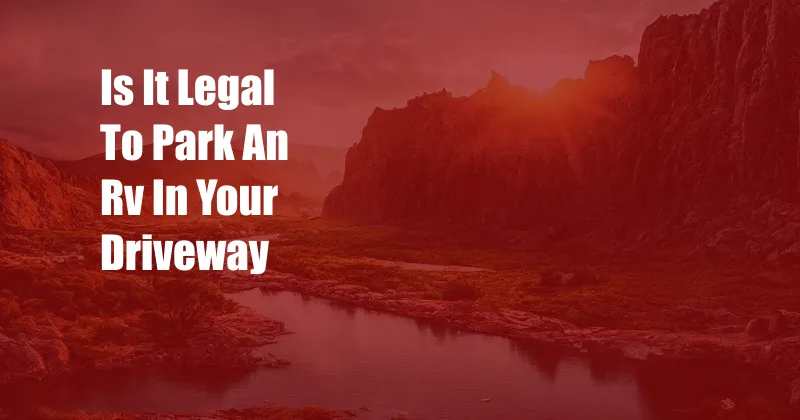
Is it Legal to Park an RV in Your Driveway?
Have you ever dreamed of owning an RV and embarking on road trip adventures? If so, you’ve probably wondered about the legalities of parking your RV in your driveway. In most cases, the answer is yes, it’s legal to park an RV in your driveway, but there are certain factors to consider that may vary depending on your location.
In this article, we’ll delve into everything you need to know about parking an RV in your driveway, including the legal implications, tips for maintaining a safe and compliant RV parking setup, and expert advice. Whether you’re a seasoned RVer or just starting to explore this exciting lifestyle, this article will provide you with the knowledge and resources you need to navigate the ins and outs of RV parking.
Understanding Local Regulations
City Ordinances and HOA Policies
When it comes to parking an RV in your driveway, the most important factor to consider is local regulations. Every city and municipality has its own set of ordinances and zoning laws that govern the parking of RVs and other vehicles. These regulations can vary widely from one jurisdiction to another, so it’s essential to check with your local authorities before parking your RV in your driveway.
In addition to city ordinances, you may also need to follow homeowners association (HOA) policies if you live in a planned community. HOAs often have covenants and restrictions that govern the appearance and use of properties within their jurisdictions. Some HOAs may have rules that prohibit or restrict the parking of RVs in driveways, so it’s crucial to check with your HOA before setting up your RV.
General Guidelines and Considerations
Size and Weight Restrictions
Once you’ve determined that it’s legal to park an RV in your driveway, you’ll need to consider the size and weight of your RV. Some driveways may not be able to accommodate larger RVs, especially if there are vehicles or other obstacles in the way.
It’s important to measure your driveway and weigh your RV to ensure that it will fit properly. You should also consider the weight distribution of your RV and make sure that it’s evenly distributed across the driveway to avoid any damage.
Safety and Accessibility
Safety should be your top priority when parking an RV in your driveway. You’ll need to ensure that your RV is parked in a way that doesn’t obstruct traffic or block access to your home or other buildings.
You should also consider the visibility of your RV. If your RV is parked in front of a window or doorway, it could create a blind spot and make it difficult to see when exiting your driveway. If possible, try to park your RV in a location that minimizes the risk of accidents.
Tips for Maintaining a Compliant RV Parking Setup
Secure Your RV
To prevent your RV from rolling or moving while parked in your driveway, it’s important to chock the wheels and use wheel stoppers. You should also use a leveling system to keep your RV level and stable.
Maintain Your RV
Regular maintenance is essential to keeping your RV in good condition and preventing any potential hazards. Make sure to inspect your RV regularly for any signs of damage or wear and tear, and address any issues promptly.
Keep Your Driveway Clean
A clean driveway not only improves the appearance of your property but also helps to prevent accidents. Sweep and wash your driveway regularly to remove any debris or slippery substances that could pose a hazard.
Expert Advice from Seasoned RVers
Here are some tips from experienced RVers on how to get the most out of parking your RV in your driveway:
- Consider using a driveway skirt to enclose the space beneath your RV and improve the aesthetics of your property.
- Install outdoor lighting around your RV to increase visibility and safety at night.
- Use a water filtration system to ensure that you have access to clean drinking water while parked in your driveway.
- Be a good neighbor and respect the rules and regulations of your community.
Frequently Asked Questions (FAQs)
Q: Can I live in my RV in my driveway?
A: In most cases, it is not legal to live in your RV in your driveway permanently. However, some cities and municipalities may have specific ordinances that allow for RV living in driveways for limited periods of time.
Q: What are the penalties for illegal RV parking?
A: The penalties for illegal RV parking can vary depending on your jurisdiction. In general, you may be fined or even have your RV towed if you park it in violation of local ordinances or HOA rules.
Q: What are the benefits of parking my RV in my driveway?
A: Parking your RV in your driveway can save you money on storage fees and give you easy access to your RV for weekend getaways or road trips.
Conclusion
Parking an RV in your driveway can be a convenient and cost-effective solution for RV owners. However, it’s important to remember that there are certain legal and practical considerations to keep in mind. By understanding local regulations, following general guidelines, and taking into account expert advice, you can ensure that your RV parking setup is safe, compliant, and enjoyable.
Are you interested in learning more about RV parking and other RV-related topics? Check out our blog for the latest news, tips, and expert insights on all things RVing.